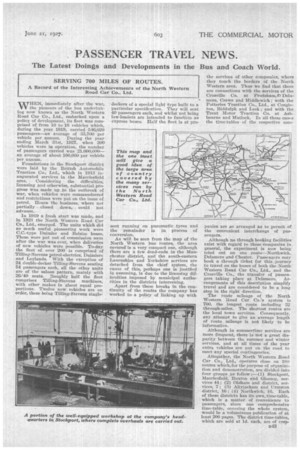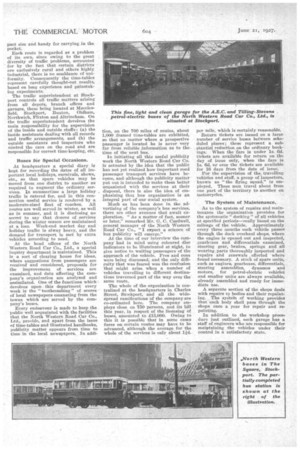_ PASSENGER TRAVEL NEWS.
Page 69

Page 70

If you've noticed an error in this article please click here to report it so we can fix it.
The Latest Doings and Developments in the Bus and Coach World.
SERVING 700 MILES OF ROUTES.
A Record of the Interesting Achievements of the North Western Road Car Co., Ltd.
WHEN, immediately after the war, the pioneers of the bus undertaking now known as the North Western Road Car Co., Ltd., embarked upon a policy of development, its fleet was comprised of from 10 to 16 vehicles which, during the year 1919, carried 516,020 passengers—an average of 83,700 per vehicle per annum. During the year ending March 31st, 1927, when 200 vehicles were in operation, the number of passengers carried was 21,000,000— an average of about 100,000 per vehicle per annum.
Foundations in the Stockport district were laid by the British Automobile Traction Co.; Ltd., which in 1913 inaugurated services in the Macclesfield area. Considering the difficulties, licensing and otherwise, substantial progress was made up. to the outbreak of war, when vehicles were commandeered and restrictions were put on the issue of petrol. Hence the business, where not partially closed down, could not
advance. •
In 1919 a fresh start was made, and In 1923 the North Western Road Car Co., Ltd., emerged. The units which did so much useful pioneering work were C.C.-type Daimler and Belsize buses. These were put out of commission soon after the war was over, when deliveries of new vehicles were possible. To-day the fleet of over 200 is comprised of Tilling-Stevens petrol-electrics, Daimlers and Leylands. With the exception of 24 double-decker Tilling-Stevens seating 54 passengers each, all the other units are of the saloon pattern, mainly with 26/40 seats. Roughly half the fleet comprises Tilling-Stevens machines, with other makeg in about equal proportions. Twelve new vehicles are on order, these being Tilling-Stevens single:
deckers of a special light type built to a particular specification. They will seat 40 passengers each, and whilst not being low-loaders are intended to function as express buses. Half the fleet is at pro
sent running on pneumatic tyres and the remainder is in process of conversion.
As will be seen from the map of the North Western bus routes, the area covered is a very compact one, although there are a few dead-ends in the Manchester district, and the south-eastern Lancashire and Yorkshire services are detached from the chief system, the cause of this, perhaps one is justified in assuming,-is due to the licensing clifiiculties imposed by municipal authorities in the districts intervening.
Apart from these breaks in the continuity of the routes the company has worked to a policy of linking up with the services of other companies, where they touch the borders of the North Western area. Thus we find that there are connections with the services of the CrosviLle Co. at Frodsham,47 Delamere, Crewe and Middlewieh with the Potteries Traction Co., Ltd., at Congleton, 13iddulph and Leek ; and with the Trent Motor Traction Co. at Ashbourne and Matlock. In all these cases the time-tables of the respective corn patties are so arranged as to permit of the convenient interchange of passengers.
Although no through booking facilities exist with regard to these companies in. general, the experiment is now being tried out on one route—Northwich, Delamere and Chester. Passengers may book a through ticket for this journey to travel on the buses of both the North Western Road Car Co., Ltd., and the Crosville Co., the transfer of passengers taking place at Delamere. Arrangements of this description simplify travel and are considered to be a long step in the right direction.
The route mileage of the North Western Road Car Co.'s system is 700, the longest route including 32 through-miles. The shortest routes are the local town services. Consequently, any attempt to give an average length of route mileage is not likely to be informative.
Although in summertime services are more frequent, there:is -not a great disparity between the summer and winter services, and at all times of the year extra vehicles are put on the road to 'fleet any special contingencies.
Altogether, the North Western Road Car Co., Ltd., operates close on 100 routes which, for the purpose of organization and demonstration, are divided into four groups as follow :—(1) Stockport, Macclesfield, Buxton and Glossop, services 44; (2) Oldham and district, services, 7; (3) Altrineham and Urmston district, 16: (4) Northwieh, JO. Each of these districts has its own,tiene-table, which is a matter of convenience to passengers, since one comprehensive time-table, covering the whole system, would be a voluminous publication of at least 200 pages. The district time-tables, which are sold at id. each, are of coin
pact size and handy for carrying in the pocket.
Each route is regarded as a problem of its own, since owing to the great diversity of traffic problems, accounted for by the fact that certain districts are exclusively rural and others highly industrial, there is no semblance of uniformity. Consequently the time-tables represent carefully thought-out results, based on long experience and painstaking experiments.
The traffic superintendent at Stockport controls all traffic matters arising from all depots, branch offices and garages, these being located at Macclesfield. Stockport, Buxton, Oldham, Northwich, Flixton and Altrincham. On the traffic superintendent devolves the main responsibility for the supervision of the inside and outside staffs: (a) the inside assistants dealing with all records and traffic arrangements, and (b) the outside assistants and inspectors who control the cars on the road and are responsible for correct time-keeping, etc.
Buses for Special Occasions.
At headquarters a special diary is kept for recording the dates of all important local holidays, carnivals, shows, etc., so that spare vehicles may be moved from one district to another as required to augment the ordinary services. In summertime a large holiday traffic is catered for, and in this connection useful service is rendered by a moderate-sized fleet of coaches. All routes are well served in winter, as well as in summer, and it is disclosing no secret to say that dozens of services during the winter season are maintained at a loss. Week-end market day and holiday traffic is alway heavy, and the demand for transport is met by extra vehicles according to need.
At the head offices of the North Western Road CUT Co., Ltd., a special inquiry department is maintained. This is a sort of clearing house for ideas, where suggestions from passengers are received and considered, proposals for the improvement of services are examined, and data affecting the company's organization are analyzed and assimilated. One of the functions which: devolves upon this department every week is the " toothcombing " of scores of local newspapers emanating from the towns which are• served by the company's buses.
Every endeavour is made to keep the public well acquainted with the facilities that the North Western Road Car Co., Ltd., provide, and apart from the issue of time-tables and illustrated handbooks, publicity matter appears from time to time in the local newspapers. In addi tion, on the 700 miles of routes, about 1,000 framed time-tables are exhibited, so that no matter where a prospective passenger is located he is never very far from reliable information as to the. time of the next bus.
In initiating all this useful publicity work the North Western Road Car Co. is actuated by the idea that the public has not yet realized haw important road passenger transport services have become, andalthough the publicity matter put out is intended to make them better acquainted with the services at their disposal, there is also the idea of emphasizing that bus organization is an integral part of our social system.
Much as has been done in the advertising of the company's bus services, there are other avenues that await exploration. "As a matter of fact, sooner or later," remarked Mr. G. C. Cardwell, general manager of the North Western Road Car Co., " I expect a science of bus publicity will emerge."
At the time of our interview the company had in mind using coloured disc indicators to be illuminated at night, to give notice to waiting passengers of the approach of the vehicle. Pros and cons were being discussed, and the only difficulty that was feared was the confusion that might arise when a number of vehicles travelling to different destinations traversed part of the way over the same route.
The whole of the organization is centralized at the headquarters in Charles Street, Stockport, and all the widespread ramifications of the company are co-ordinated here. The company employs close on 750 persons, and its bill this year, in respect of the licensing of buses, amounted to £15,000. Owing to this it is possible that in some cases fares on certain routes may have to be advanced, although the average for the whole of the services is only about tid. per mile, which is certainly reasonable.
Return tickets are issued on a large number of service buses between scheduled places; these represent a substantial reduction on the ordinary bookings. When the fare is under 1s. 6d. tickets are available for return on the day of issue only, when the fare is 1s. 6d. or over the tickets are available for 16 days from the date of issue.
For the supervision of the travelling vehicles and staff, a group of inspectors, known as " the flying squad," is employed. These men travel about from one part of the territory to another on motorcycles.
The System of Maintenance, As to the system of repairs and maintenance the organization provides for the systematic " docking" of all vehicles at specified periods—really based on the mileage of the vehicle. Approximately every three months each vehicle passes through the dock overhaul shops, where the engine is opened out and inspected, gearboxes and differentials examined, steering gear, brakes, springs and all wearing parts thoroughly inspected and repairs and renewals effected where found necessary. A stock of spare units, such as engines, gearboxes, differentials, steering assemblies, dynamos and motors, for petrol-electric vehicles and smaller units are always available, already assembled and ready for immediate use, A separate section of the shops deals with repairs to bodies and their repainting. The system of working provides that each body shall pass through the shops once a year for repair and repainting.
In addition to the workshop procedure just outlined, each garage has a staff of engineera who are responsible for maintaining the vehicles under their control in a satisfactory state.




















































































































